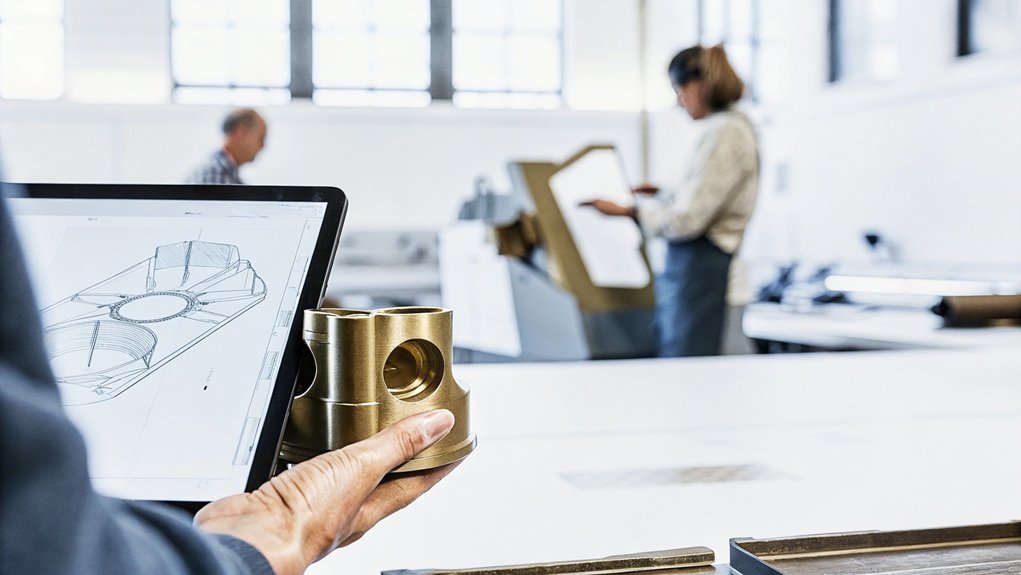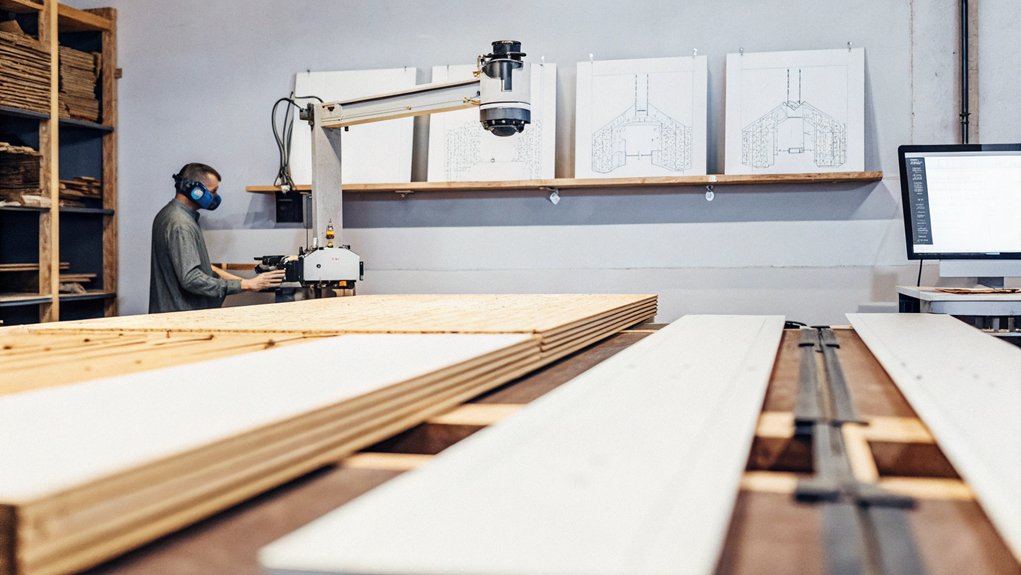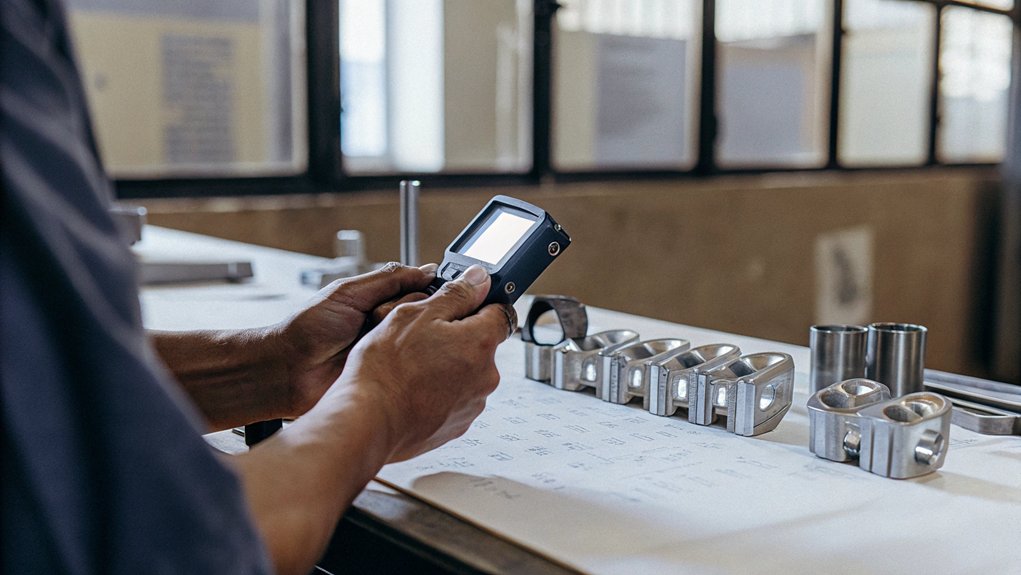The Complete Guide to Precision Custom Manufacturing
When you explore precision custom manufacturing, you'll uncover a landscape filled with complex processes designed to meet specific needs. Understanding these intricacies is essential for achieving high-quality products. As you consider the benefits of customized solutions, you must also examine the key technologies that drive efficiency and accuracy. But how do you guarantee that your chosen manufacturer meets your stringent requirements? The answer lies in a careful assessment of several critical factors.
Key Takeaways
- Precision custom manufacturing focuses on small batch production, ensuring high-quality goods through advanced technologies like CNC machining and CAD.
- Utilizing stringent quality control processes, manufacturers can achieve tolerances as tight as ±0.001 inches for superior product quality.
- The ability to adapt to design changes quickly minimizes downtime and enhances operational efficiency, leading to faster market responsiveness.
- Hybrid cutting techniques and additive manufacturing facilitate rapid prototyping and intricate component creation, optimizing production based on material type.
- When selecting a custom manufacturer, consider their track record, quality standards, lead times, and pricing to ensure alignment with your project needs.
Understanding Custom Manufacturing Processes
Understanding custom manufacturing processes is essential for any business looking to optimize production and meet specific client needs.
Custom manufacturing solutions focus on producing goods in small batches, utilizing advanced technology like CNC machining and computer-aided design (CAD) to create complex designs. This approach emphasizes collaboration, ensuring quality assurance and quality control at every production stage.
By leveraging techniques such as precision sheet metal fabrication and additive manufacturing, you can adapt to design changes swiftly, minimizing downtime. This flexibility not only enhances operational efficiency but also fosters customer satisfaction, as tailored solutions strengthen relationships and loyalty.
Ultimately, mastering these manufacturing processes can markedly elevate your business's performance in a competitive landscape.
Benefits of Customized Solutions

When seeking to enhance production capabilities, the benefits of customized solutions in precision manufacturing become clear.
Customized manufacturing elevates product quality through stringent quality control, minimizing defects and maximizing performance.
Customized manufacturing enhances product quality by enforcing rigorous quality control, effectively reducing defects and optimizing performance.
Tailored manufacturing processes guarantee cost-effective solutions by reducing material waste and excess inventory, translating into long-term savings.
Additionally, faster lead times enable you to respond swiftly to market demands, shortening time-to-market.
This flexibility in production allows you to adapt to design changes without significant downtime, guaranteeing your offerings remain relevant.
Greater customization means you can meet specific needs, justifying premium pricing and enhancing overall customer satisfaction.
Key Technologies and Techniques

Customized solutions in precision manufacturing rely heavily on cutting-edge technologies and techniques that enhance production quality and efficiency.
CNC machining stands out with its ability to achieve tolerances as tight as ±0.001 inches, ensuring high precision for custom parts.
Additive manufacturing, or 3D printing, facilitates rapid prototyping, allowing you to modify designs without extensive tooling.
Subtractive manufacturing techniques excel in creating intricate components while maintaining superior surface finishes.
Injection molding is essential for small batch production, offering quick turnaround times across various materials.
Finally, hybrid cutting techniques combine methods like rotary die cutting and laser cutting to optimize production efficiency based on material type and design complexity, markedly enhancing your manufacturing capabilities.
Quality Control and Assurance in Custom Manufacturing

In order to achieve the highest standards in custom manufacturing, effective quality control and assurance practices are essential throughout the entire production process.
Implementing ISO 9001-certified processes guarantees consistency and fosters continuous improvement. Utilizing advanced technologies, such as CNC machining, enables precision manufacturing that meets tight tolerances, essential for high-quality components.
ISO 9001-certified processes ensure consistency and promote continuous improvement, while CNC machining delivers precision for high-quality components.
Key aspects of quality control include:
- Strict supervision at every production stage
- Regular performance testing and inspections
- Emphasis on material selection and supplier quality
- Adherence to established quality benchmarks
- Continuous feedback loops for process enhancement
Selecting the Right Custom Manufacturer

Choosing the right custom manufacturer is essential to the success of your project, as it directly impacts product quality, production timelines, and overall costs.
Begin by researching potential custom manufacturers, focusing on their track record and customer reviews. Confirm they've experience with your specific manufacturing requirements, as diverse ranges of products can necessitate unique production methods.
Don't overlook the importance of inspecting samples to verify their craftsmanship meets your quality standards. Additionally, evaluate their lead times to confirm timely delivery without compromising quality.
Finally, discuss pricing, including minimum order quantities (MOQs), to align with your budget and expected profit margins. This thorough approach will help you select a manufacturer that truly meets your project's needs.
Frequently Asked Questions
What Industries Benefit Most From Precision Custom Manufacturing?
When you think about industries thriving on precision, it's clear that automotive components, aerospace parts, and medical devices lead the way.
You'll also find electronics manufacturing, consumer products, and industrial machinery benefiting immensely.
Defense equipment relies on precision for safety, while renewable energy and precision agriculture leverage it for innovation.
Custom tooling enhances efficiency across these sectors, ensuring your needs are met with the utmost accuracy and quality, fostering a sense of connection and trust.
How Can I Estimate Costs for Custom Manufacturing Projects?
To estimate costs for your custom manufacturing projects, start by analyzing key cost factors like project scope, material selection, and design complexity.
Consider labor costs and equipment expenses, along with overhead calculations.
Don't forget volume pricing and obtaining supplier quotes, as these can greatly impact your budget.
Keeping your budget constraints in mind, you'll gain a clearer understanding of potential expenses and can better plan your project's financial aspects.
What Are the Environmental Impacts of Custom Manufacturing?
The environmental impacts of custom manufacturing can be staggering, but you can mitigate them with strategic choices.
Implementing sustainable practices and energy efficiency measures reduces your carbon footprint. Prioritizing resource conservation and eco-friendly materials enhances waste reduction and pollution control.
How Long Does the Custom Manufacturing Process Typically Take?
The custom manufacturing process typically varies in duration based on several factors.
Lead time considerations, design iteration cycles, and material selection impacts can greatly affect timelines.
You'll want to focus on project management strategies and maintain effective client communication practices.
Additionally, production scalability options and the importance of supplier relationships can streamline the process, while technology integration benefits enhance efficiency.
Quality assurance processes also play a crucial role in optimizing your manufacturing timeline.
Can Small Businesses Utilize Precision Custom Manufacturing Services?
Absolutely, small businesses can thrive by leveraging precision custom manufacturing services.
Think of it as having a Swiss Army knife at your disposal; you gain small business advantages through design flexibility and quality assurance. By outsourcing production, you access cost-effective solutions that enhance production efficiency.
Additionally, these services offer scalability options, enabling you to explore niche markets while fostering local partnerships.
With precision tools, your business can adapt and grow in today's competitive landscape.
Conclusion
In a world where cookie-cutter products reign supreme, you might wonder why you'd ever choose precision custom manufacturing. But hey, who wouldn't want a product tailored just for them, complete with impeccable quality and rapid prototyping? Sure, embracing advanced technologies like CNC machining sounds complicated, but isn't it ironic how the most complex processes lead to the most satisfying results? So, as you seek the perfect manufacturer, just remember: your unique needs deserve anything but a one-size-fits-all solution.